दोस्तों,
मेरे पिताजी डाक्टर एस बी मिश्रा एक रिटायर्ड भूगर्भ शास्त्री (geologist) हैं। उनकी किताब "Story of an Ordinary Indian" अगले वर्ष Roli Books द्वारा प्रकाशित होगी। उन्होंने एक कविता लिखी, यहाँ प्रस्तुत है ...
यहाँ पढ़ें एक पुरानी पोस्ट :
http://rovingwriter.blogspot.com/2008/04/my-father-dr.html
और ये रही कविता:
शेख चिल्ली की तरह मैं सोचता हूँ बैठकर
बंद आँखों से कभी मैं देखता सपने मुंगेरीलाल के
गरीबों के खजाने की अगर चाभी हमारे पास आ जाये
फैसले करने की बड़ी कुर्सी हमारे हाथ लग जाये
देश के हर पार्क में मैं तुदुधुत्तू बनाऊंगा
हर सड़क पर, हर गली में मूर्तियाँ अपनी लगाऊंगा
कौन पूछेगा मुझे मरने के बाद
कौन पहचानेगा कुर्सी चली जाने के बाद
इसलिए मैं मूर्तियाँ अपनी सजा लूं
फूल मालाएं चढाकर आरती अपनी करा लूं
और यदि फुरसत मिले तो बैंक के ही लकारों को
दूं बना अपनी तिजोरी
और अपनी गाय बकरी कूकुरों के नाम
से खाते खुलाऊँ
याद है ना देश का फक्कड़ फकीर
नाम जिसका था कबीर
कह गया माया ठगिन है
इसलिए मैं दूर माया से रहूँगा
बस ढेर माया के लगाउंगा
Sunday, October 4, 2009
Friday, August 28, 2009
Life is beautiful: A Kasauli diary
I saw Mars last night. With the naked eye.
I saw a barber who works his craft with the pride of a painter or a classical singer. I saw old grandmothers laugh like schoolgirls with two plaits. I waved to the one-year-old child I meet every day on my evening walk and he got up promptly, waving his tiny hand and trying to walk towards me. I saw a rainbow far away over the hills. I saw glow worms. I heard rain.
I picked up my camera after many, many days.
I am soaking in all I can, living out all the tiny moments this small town is throwing at me, immersing myself in the cool breeze and the wayward mist that wraps me when I walk breathless up the hills. I am wading through its silences, sauntering through its British-era tranquility, a mesmerised visitor who refuses to go away.
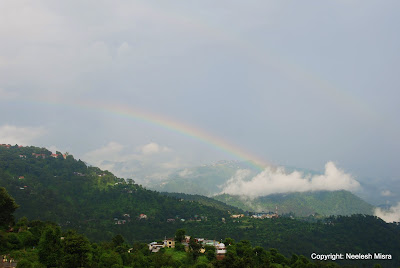
Panting after a steep climb, sweating in the cold mountain air, my friend Rahul Pandita and I pop up again and again at the big shop next to the cantonment where the man I call "Mr. Maggi" sits emotionless, springing to life the moment we order noodles after a day of being locked up in two hotel rooms and trying to finish a long-unfinished book.
But there is something else unfinished -- take a deep breath as as you order that coffee from the machine and cringe at the cost of mineral water and sit gingerly on the dew-soaked chair in black metal. It is our own unfinished lives that we are bringing to Kasauli, pausing for a moment, taking in the pure, innocent mountain air, reflecting on our lives -- seeking answers.
Sometimes finding them. Sometimes realising there were better ways to seek them.
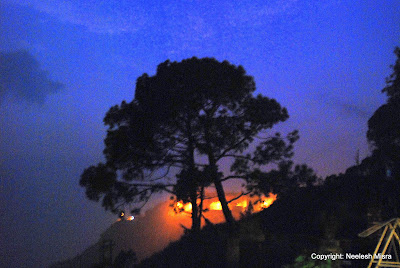
Life is beautifu. Why unnecessarily complicate it? The answers are right here, walking alongside the questions.
Opposite Mr. Maggi's, there is an unusual crowd today for an August weekday in Kasauli: all of six people, sitting around a metal table. An old Uncleji gets a phone call, its his daughter in some metropolis. She asks how he is. He tells her they are having a great time, met a friend and his wife, they are sitting at the same spot where their granddaughter had danced one day. She wants a phone number. Grandpa promises to SMS it to her.
I walked. Through the cobbled street along the small market. The barber clipped away in his shop with the old world charm, relentless and focussed. The halwai next door scooped out hot, steaming jalebis, thin and crisp and bursting with calories. Some distance away, a young man sat on the pavement, chiselling away a large piece of deadwood into a beautiful work of art by a nameless artist, that would soon find place in some glorious living room in some part of India.


And soon we stood in the open air expanse outside the dining hall at the Kasauli Club, I clicking away pictures of one poor tree (see main blog picture) and the pensive skies. Were they violet, or pink? Did I care?
Rahul's friend Rajesh Dogar, whose lovely hotel Kasauli Regency we are staying in, drove us there. His wife Preetie joined us. She is a geography teacher. She knows the planets.
"That's Mars!" she said.
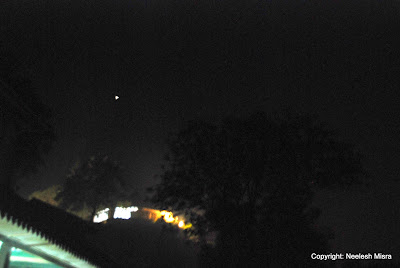
And there it was. I was seeing a planet for the first time in the clear sky. See the picture above, its the bright spot high above the roof of the Kasauli Club and the lit-up hall of the nearby mansion.
Inside in one of the halls in the club with wood panels and stone walls, a bunch of grandmothers laughed at a girls' evening out. Some elderly gentlemen sat in a corner as well, their silence interrupted by occasional guffaws.
The waiter is called Ishwar. In June, when the club is crowded and teeming with the house owners who descend on their summer homes, some ingenious people shout: "Hey Ishwar! (O God!) Can we have our drink?"
I am not going to call out to Ishwar.
I have had my drink. I am headed back to the big city, high on life.
(Photo Credit: The rainbow picture is taken by Rahul Pandita. The rest are mine)
Labels:
british-era,
kasauli,
maggi,
rahul pandita,
small town
Wednesday, August 26, 2009
जुगनुओं के शहर से एक और ख़त
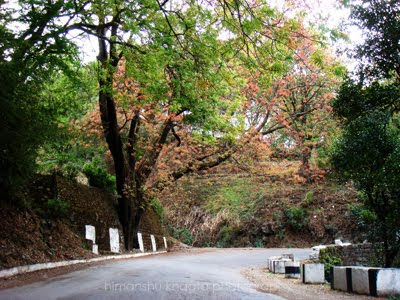
इक अजनबी है अजनबी शहर को आ गया
होटल जो लौटा तो लगा कि घर को आ गया
तन्हाई से मिलना हुआ कितने बरस के बाद
कमबख्त को करते रहे कितना तरस के याद
कितने ये चेहरे ओढ़ के दिल्ली में खो गयी
ख़त लिक्खे, पुकारा किये, खामोश हो गयी
इक छोटे से शहर में है शरमा के फिर मिली
"कैसे हो अजनबी?" है ये फरमा के फिर मिली
मैं क्या बताऊँ तुमको कि मैं कैसा हूँ क्या हूँ
तुम छोड़ गयीं मुझको मैं वहीँ पे खड़ा हूँ
इक याद का टुकडा मेरे घर भूल आई थीं
मैं आज ढूँढता उसी मंज़र को आ गया
होटल जो लौटा तो लगा कि घर को आ गया ...

अब लगता है रहता हूँ यहाँ कितने बरस से
अब रोज़ मैं तय करता हूँ जुगनू भरे रस्ते
हलकी सी सर्द है हवा, अक्सर निकलता हूँ
मैं धुंध का कम्बल लपेटे हाथ मलता हूँ
गीली सी कुर्सियों पे रोज़ चाय पीता हूँ
इक याद शुगर फ्री है, उसे घोल लेता हूँ
हैं चीनी भरी यादें भी, पर पी न पाऊंगा
इतनी मिठास ना दो मुझे, जी न पाऊंगा
तन्हाई भरे शहरों में उकता सा गया हूँ
खुद से ही ऊब कर मैं इस सफ़र को आ गया
होटल जो लौटा तो लगा कि घर को आ गया ...

चित्र साभार : इन्टरनेट (http://www.thelatestone.com/, http://www.vacationhomerentals.com/, http://www.makemytrip.com/)
Sunday, August 23, 2009
जुगनू भरे रास्ते से एक ख़त

पाँच दिन। पाँच दुनिया। कितना भाग रहा हूँ मैं।
पहले दिन द्रास में था, कारगिल से दो घंटे की दूरी पर। १९९९ का युद्धक्षेत्र। दूसरे दिन श्रीनगर में। डल झील के किनारे एक खूबसूरत होटल में असली दुनिया से बहुत दूर। तीसरे दिन दिल्ली वापस, उधार की ज़िन्दगी जीने के लिए। दफ्तर गया। फर्जी मुस्कुराया। छेड़। चुगल। डेडलाइन। चौथे दिन बंबई। अपनी फ़िल्म "सिकंदर" के प्रेमिएर में। जलसा तो बहाना था। सच में तो ख़ुद से पीछा छुडाना था। पाँचवे दिन गाड़ी से कसौली, जहाँ अभी हूँ मैं।
जीवन उथल पुथल में है। कहीं मन नहीं लगता। कब से कोई गीत नहीं लिखा। हाँ हाल में बहुत अरसे बाद गीत गाना ज़रूर शुरू किया। ग़म के गीत कमबख्त। कौन लिखते हैं इनको ये कमबख्त लोग? दोस्तों ने मेहेरबानी की है, ज़्यादा सवाल नहीं पूछते। मैं तो कभी सवाल कम, जवाब ज़्यादा, कभी सवाल ख़तम, जवाब आधा। दोस्तों की बातें बीच में काट कर कहीं और की बकने लगता हूँ। खुंदक में दो दिन लगातार बियर पी ली, ज़िन्दगी में पहली बार दो दिन लगातार। वरना अपना उसूल है, "Beer, twice a year ..."
दो दिन से कसौली में शाम को टहलने जाता हूँ। साथ में मेरा जिगरी यार राहुल पंडिता भी ही। धुंध में चलते हैं दोनों भाई। चढाई में थक जाता हूँ तो कमबख्त बैठने नहीं देता ("कमबख्त" बहुत कहने लगा हूँ क्या?) कहता है, नीलेश जी, ऐसे चर्बी कैसे घटेगी? लेकिन इस दिमाग की चर्बी का क्या राहुल मियां? जाने किस किस ग़म का मुलम्मा चढ़ गया है दिमाग में, इसकी कसरत का क्या करें?
रोज हम हांफ हांफ के उस छोटी सी मार्केट पहुँच के काफ़ी पीते हैं। धुंध में ख़ुद को डूबता महसूस करते हैं। शोर करने वाले मंहगी गाड़ियों वाले टूरिस्टों पर हँसते हैं, और उम्मीद करते हैं की जल्दी वीकएंड ख़तम हो, सब जाएँ.
होटल वापस आते आते अँधेरा हो जाता है।

जो पतला सा पहाडी रास्ता कसौली रीजेंसी तक जाता है, उस पर जुगनू भर जाते हैं. घास पर जुगनू, जैसे पड़ी रास्ते का किनारा दिखा रहे हों ताकि हम गिर न जाएँ अँधेरे में. हवा में टहलते जुगनू. ऊपर देखो तो खूबसूरत कुहरा, तनहा मुसाफिरों की तरह खड़े पेड़, हल्का अँधेरा, हल्का उजाला, उसके पीछे तारे और खुला, निश्छल आसमान ... हलकी सी ठंडक, जोर जोर से "ये जीवन है, इस जीवन का, यही है रंग रूप" गाते दो जासूस, और लगता है की यही स्वर्ग है, यहाँ कोई तकलीफ नहीं, यहाँ कोई मेरा दिल नहीं तोडेगा, यहाँ कोई ऊँगली नहीं उठाएगा ... यहीं रह जाता हूँ ...
लेकिन मुझे पता है ... ये दुनिया भी जल्दी ही छोड़नी होगी. फिर किसी और दुनिया का हो जाऊँगा. फिर छोड़ दूंगा उसे भी.
पाँच दिन। पाँच दुनिया। कितना भाग रहा हूँ मैं। किस से भाग रहा हूँ मैं?
चित्र साभार: http://www.flickr.com
Monday, July 27, 2009
कारगिल Kargil
दोस्तों आज ही कारगिल से लौटा, एक हफ्ते से वहां था ... युद्घ के समय वहां दो महीने बिताये थे, उसके बाद अब वापस गया। अजब गुज़रे सात दिन ... मोबाइल फ़ोन, टी वी और असली दुनिया के ग़मों से बहुत दूर ... ये हैं कुछ तस्वीरें ... जो दो महिलाएं घाघरा चोली में हैं उनके पति सैनिक थे ... उन पहाडियों को देख रही हैं जहाँ उन्होंने जान दी ...
Tuesday, June 23, 2009
My silence, music and Faiz
Forgive my long silence ...
Life was trying to catch up with me.
I am still walking ahead.
Let me break my long silence with the notes of music -- three of my new songs from two soon-to-be-released films ...
This is "Tere Bin Kahan Hamse" ... from the about-to-be released "Jashnn" from the Bhatts. It is composed by the hugely talented Sandesh Shandilya, and sung by Shaan and Shreya Ghoshal, one of the most talented singers in Bollywood.
http://www.youtube.com/watch?v=rOlT2BrVH0k
The next two songs are really special to me. They are from "Sikandar", written and directed by Piyush Jha and produced by Sudhir Mishra and Big Films It is a gritty and eloquent film set in Kashmir.
I have covered Kashmir as a journalist for long long years and have enduring friendships there. It was pure joy to be able to write a song in a film set in Kashmir. You cannot imagine my excitement when my friends call me to say that these two songs are playing on the FM in Kashmir ...
There is an old tradition of Urdu poetry in which a writer pays a tribute to a master by taking the "mukhda" (opening two lines) of an iconic ghazal and writes a new song.
I love the ghazal so much that I wrote two!
This first version has music by Justin-Uday:
http://www.youtube.com/watch?v=MSSW5SxuDX8&feature=related
And this is another version, with different lyrics, composed by Sandesh Shandilya.
http://www.youtube.com/watch?v=zvE716Am18I&feature=related
When I wrote these two songs, and when they were recorded, I waited with the trepidation of a student before his exam for the verdict from across the border, from Dr. Salima Hashmi, daughter of the great poet himself ... she heard both the songs and said she loved them! It was so humbling, so rewarding, and such a great relief, above all ...
These are links to some of the comments she made about the song:
Indian Express
India Today
Hindustan Times
Screen
Life was trying to catch up with me.
I am still walking ahead.
Let me break my long silence with the notes of music -- three of my new songs from two soon-to-be-released films ...
This is "Tere Bin Kahan Hamse" ... from the about-to-be released "Jashnn" from the Bhatts. It is composed by the hugely talented Sandesh Shandilya, and sung by Shaan and Shreya Ghoshal, one of the most talented singers in Bollywood.
http://www.youtube.com/watch?v=rOlT2BrVH0k
The next two songs are really special to me. They are from "Sikandar", written and directed by Piyush Jha and produced by Sudhir Mishra and Big Films It is a gritty and eloquent film set in Kashmir.
I have covered Kashmir as a journalist for long long years and have enduring friendships there. It was pure joy to be able to write a song in a film set in Kashmir. You cannot imagine my excitement when my friends call me to say that these two songs are playing on the FM in Kashmir ...
There is an old tradition of Urdu poetry in which a writer pays a tribute to a master by taking the "mukhda" (opening two lines) of an iconic ghazal and writes a new song.
I love the ghazal so much that I wrote two!
This first version has music by Justin-Uday:
http://www.youtube.com/watch?v=MSSW5SxuDX8&feature=related
And this is another version, with different lyrics, composed by Sandesh Shandilya.
http://www.youtube.com/watch?v=zvE716Am18I&feature=related
When I wrote these two songs, and when they were recorded, I waited with the trepidation of a student before his exam for the verdict from across the border, from Dr. Salima Hashmi, daughter of the great poet himself ... she heard both the songs and said she loved them! It was so humbling, so rewarding, and such a great relief, above all ...
These are links to some of the comments she made about the song:
Indian Express
India Today
Hindustan Times
Screen
Tuesday, February 3, 2009
I met my own slumdog
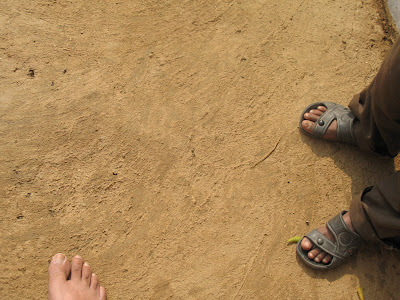
This weekend in Gujarat, I met a slumdog. Who told me of a millionaire.
He was a tea shop waiter at a restaurant on a Gujarat highway. But how did he get to learn to talk in English? How does he know about European countries? How does he know that the Saluki dog originated in the Middle East, is one of the rarest breeds in the world and can race at 92 kilometres per hour?
Well, like Danny Boyle’s slumdog, this one had a back story too.
I was on a hundred-kilometre drive from Ahmedabad down the highway towards Rajkot, stopping at various places to ask the kind of inane questions that journalists ask. At one such break, I met Mohammed Javed, a fairly tall, 19-year-old who serves tea at a roadside dhaba and speaks barely opening his mouth.
He had tousled hair, cheeks that a mother would have wanted to pull, and a smile that would have set most schoolgirls swooning. He had unclean teeth, but then abundant use of toothpaste would have solved that problem too.
Most importantly, he had seen the world and lived through an arc of dreams and desperation – just like the young lad in Danny Boyle’s flick which has the world gushing over it.
Javed lives in Zainabad village, some 15 kilometres from the restaurant where we stopped. He refused to be photographed. He refused to talk about Narendra Modi. The only thing he spoke freely about was his life.
Javed had to drop out of school in the eight standard. It had been adding up for a long time. Teachers were haranguing him every day for not getting text books. His father used to shout at him for not doing well at studies and not doing his homework.The reason was simple, it was the same reason that prevented millions across the country from continuing education.
“I wanted to study, but due to poverty I could not,” Javed told me, looking straight in my eye as if daring me. In his right hand, he held a small teacup and a small cloth to wipe tables.
“In school, the teachers shouted at me every day, they said I had no interest in studies because I wasn’t getting my text books. My father could not buy text books. But at home, he shouted at me for poor studies. But how could I study without books?”
I turned my eyes away, kind of embarrassed. A sensible, young, hardworking young man was standing in front of me with his life ruined by poverty. It was not a happy moment.
“I was ashamed to tell teachers that I was too poor. They scolded me in school,” he said. “My father scolded me. We could not buy text books.”
Around him, there was fear and uncertainty. It was only a year after the deadly Gujarat riots of 2002, when hundreds of Muslims and Hindus had been killed in clashes and Muslims felt ghetto-ed in and vulnerable.
When he couldn’t take the situation at home any more, Javed walked out of his home one morning at the age of 13, boarded a packed jeep to the nearest bus station, then took a bus to Ahmedabad, and finally a train to New Delhi.
He had arrived in India’s capital with just a few rupees in his pocket, out to change his life as they did in the books and the movies.
Well, like Danny Boyle’s slumdog, this one had a back story too.
I was on a hundred-kilometre drive from Ahmedabad down the highway towards Rajkot, stopping at various places to ask the kind of inane questions that journalists ask. At one such break, I met Mohammed Javed, a fairly tall, 19-year-old who serves tea at a roadside dhaba and speaks barely opening his mouth.
He had tousled hair, cheeks that a mother would have wanted to pull, and a smile that would have set most schoolgirls swooning. He had unclean teeth, but then abundant use of toothpaste would have solved that problem too.
Most importantly, he had seen the world and lived through an arc of dreams and desperation – just like the young lad in Danny Boyle’s flick which has the world gushing over it.
Javed lives in Zainabad village, some 15 kilometres from the restaurant where we stopped. He refused to be photographed. He refused to talk about Narendra Modi. The only thing he spoke freely about was his life.
Javed had to drop out of school in the eight standard. It had been adding up for a long time. Teachers were haranguing him every day for not getting text books. His father used to shout at him for not doing well at studies and not doing his homework.The reason was simple, it was the same reason that prevented millions across the country from continuing education.
“I wanted to study, but due to poverty I could not,” Javed told me, looking straight in my eye as if daring me. In his right hand, he held a small teacup and a small cloth to wipe tables.
“In school, the teachers shouted at me every day, they said I had no interest in studies because I wasn’t getting my text books. My father could not buy text books. But at home, he shouted at me for poor studies. But how could I study without books?”
I turned my eyes away, kind of embarrassed. A sensible, young, hardworking young man was standing in front of me with his life ruined by poverty. It was not a happy moment.
“I was ashamed to tell teachers that I was too poor. They scolded me in school,” he said. “My father scolded me. We could not buy text books.”
Around him, there was fear and uncertainty. It was only a year after the deadly Gujarat riots of 2002, when hundreds of Muslims and Hindus had been killed in clashes and Muslims felt ghetto-ed in and vulnerable.
When he couldn’t take the situation at home any more, Javed walked out of his home one morning at the age of 13, boarded a packed jeep to the nearest bus station, then took a bus to Ahmedabad, and finally a train to New Delhi.
He had arrived in India’s capital with just a few rupees in his pocket, out to change his life as they did in the books and the movies.

But Javed’s life was no movie, and would not be made into one at least by the time I met him. He began to live in a shanty, and then got a job as a domestic help with a family. He cooked and cleaned.
The city wasn’t about to change his life. He slogged for a year, then went home. The employer did not even give him his wages.
There, he went a millionaire, a local feudal lord of sorts who owned a resort, loved dogs and lived a strange life of opulence and grandeur in the midst of barren nowhere.
He was out on dog duty.
“I trained dogs. There were the Saluki dogs, which had been brought from Abu Dhabi; there were Labradors, bull terriers (which he pronounced as “Bultarians”), Dalmatians and Cocker Spaniels,” Javed said. I heard on stunned. Sorry to sound whatever but t was the last thing I hoped to hear from a tea shop waiter on a Gujarat highway.
He also escorted Western tourists into the Rann of Kutch on sightseeing tours, learning some English and learning to speak it well.
But that was where the dream ended. He lost both those jobs and began to work at the tea shop.
“I have thought a lot about my life. If I had been able to study, I would have had a proper job today. I am very confused today about my life. I wish I had continued at school,” he said. Cars whizzed by on the highway.
His employer shouted from the counter, asking him in Gujarati what he was talking to the stranger about. A customer shouted to him to take away the cups. Javed wasn’t listening. It was one of those moments when a perfect stranger walks up to you and unwittingly helps you get a perspective on your own life.
Javed had been waiting for such a perfect stranger for a long time. He had been waiting to get to speak to some city visitor some day who would strike up a random conversation with him, take him to the city again and change his life again as he had tried to.
I would have loved to, Javed, but I was not that perfect stranger. I was just a selfish self-consumed urban Indian, a street reporter who pretends to care about the dispossessed and gets kicks out of telling stories of their dreams and heartbreak.
All I could have done was to pay for my tea, and wished you well. That’s all I did.
I had to be on my way. I had to be back in my plush hotel room by the evening, throw aside my dusty clothes, sink into the soft mattress after a shower, order some nice pasta and fresh lime soda, watch some TV, and then sleep.
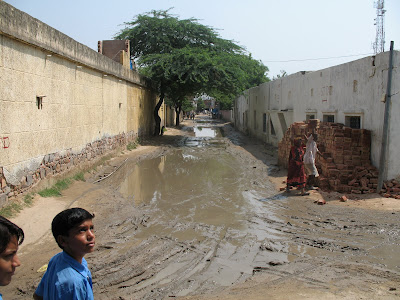
But I couldn’t be the selfish Indian that day. I kept thinking of Javed, of whether his life would change again, whether he would hunt down his dreams like the legendary Saluki hunts in the wild, and whether I had done the wrong thing. I remembered the last bit of our conversation.
“Can I have your number please, if I ever get to come to Delhi again?” he had said in proper English. I heard myself replying in English: “Sure, here it is.”
I gave him the land line, I did not give him the mobile number. Should I have given him the mobile number?
“I’ll call you sometime,” Javed had said as he shook my hand. Then he went away into the kitchen with the dirty cup, back to his slumdog life.
Call me sometime, Javed. Phone a friend.
(Pictures are illustrative)
Labels:
Danny Boyle,
european,
gujarat,
Middle East,
millionaire,
rann of kutch,
saluki,
slumdog
Saturday, January 24, 2009
Inside the Idiot Box of memory

Let me take you to several minutes before 6 p.m. on crisp winter evenings in the 1980s. In a cobweb of narrow Lucknow lanes, my four young uncles would be about to return home on their Bajaj scooters, my tough cookie grandfather would be about to have his evening tea and on the first floor, my grandmother would be cutting guavas and bringing them to my twin brother Shailesh and me.
That was the moment when I would get up for the highlight of our winter vacation days, in the neighbourhood someone had so stupidly named Ghasiyari Mandi.
A massive click. I would switch on the thick cylindrical silver knob of the Uptron Urvashi TV set, encased in a wooden cabinet. Vertical vibgyor colour bands would show up, and then, suddenly, the rotating Doordarshan logo that seemed to us like two huge kajus hugging a rasgulla in the centre. Sublime, pre-24X7 moment. The moment my brother and I would have waited for the whole day, killing time to prepare ourselves to open the rolling wooden shutter on the TV cabinet.
That was the moment when I would get up for the highlight of our winter vacation days, in the neighbourhood someone had so stupidly named Ghasiyari Mandi.
A massive click. I would switch on the thick cylindrical silver knob of the Uptron Urvashi TV set, encased in a wooden cabinet. Vertical vibgyor colour bands would show up, and then, suddenly, the rotating Doordarshan logo that seemed to us like two huge kajus hugging a rasgulla in the centre. Sublime, pre-24X7 moment. The moment my brother and I would have waited for the whole day, killing time to prepare ourselves to open the rolling wooden shutter on the TV cabinet.

Doordarshan was the anchor of my growing up years in Lucknow and Nainital. Its wholesome programming shaped me as an individual, like it did millions of others. We never realised it then, but Doordarshan kept India tied to its cultural and philosophical moorings – a bond that was yanked ruthlessly with the arrival of cable. Doordarshan left me with a thousand nuggets of nostalgia that I cling on to.
Heck, I was such a sucker that I often religiously watched "Chaupal", the equivalent of New Delhi's "Krishi Darshan", for the folk songs after the chats about the wheat bug pesticide.
So you can imagine my plight when India were playing the West Indies, Malcolm Marshall was about to bowl to Srikkant, and my grandfather would walk in for his morning puja. I think it was around the time when Doordarshan had first introduced slow motion action replays, god bless them.
Heck, I was such a sucker that I often religiously watched "Chaupal", the equivalent of New Delhi's "Krishi Darshan", for the folk songs after the chats about the wheat bug pesticide.
So you can imagine my plight when India were playing the West Indies, Malcolm Marshall was about to bowl to Srikkant, and my grandfather would walk in for his morning puja. I think it was around the time when Doordarshan had first introduced slow motion action replays, god bless them.

Everyone feared my grandfather. So we would watch in terrified desperation as he switched off the TV in a split second, and sat down cross-legged on the floor to please the gods. Shailesh and I knew the excruciating drill we would have to wade through before returning to the match: first the tiny quilt placed overnight over the miniature brass Krishna and Radha would be removed to wake them up, then a little bath for the shiv ling, then a little scrub for Hanuman ji. Then he would make sandalwood paste and anoint the gods with it.
Finally all the gods were prim and proper, but India would be thirty-four for five wickets.
There were no such interruptions in the evenings, when all of us watched "Buniyaad", "Bikram aur Betaal", "Fauji", together over dinner – except when they showed the Lyril ad under the waterfall or the Nirodh and Mala-D promos which jolted all conservative families and provoked senseless, embarrassed comments from everyone.
"I'll just check the gas stove". "Did Raju call? I'll just check if he is coming". "Did you lock the front door? I'll run and check". "Did you check your blood pressure this week?" Everybody wanted to check something right at that moment. Anything in the world to avoid watching the contraceptive ad.
I acknowledge, there were some days when I did not watch TV. That's because I was on it. A tiny part of my Doordarshan experience in Lucknow was also appearing on TV to sing or recite a poem – or when I had won a debate contest and they called me to be interviewed because they could find no one else.
Finally all the gods were prim and proper, but India would be thirty-four for five wickets.
There were no such interruptions in the evenings, when all of us watched "Buniyaad", "Bikram aur Betaal", "Fauji", together over dinner – except when they showed the Lyril ad under the waterfall or the Nirodh and Mala-D promos which jolted all conservative families and provoked senseless, embarrassed comments from everyone.
"I'll just check the gas stove". "Did Raju call? I'll just check if he is coming". "Did you lock the front door? I'll run and check". "Did you check your blood pressure this week?" Everybody wanted to check something right at that moment. Anything in the world to avoid watching the contraceptive ad.
I acknowledge, there were some days when I did not watch TV. That's because I was on it. A tiny part of my Doordarshan experience in Lucknow was also appearing on TV to sing or recite a poem – or when I had won a debate contest and they called me to be interviewed because they could find no one else.

The first time before the mike was a near-disaster. The producer of the youth show turned out to be the head of the yoga institute by the Gomti where I went every morning to fix my S-shaped spinal cord. I was in bloody awe of him. I mean, everyone saw him as something of a junior Deepak Chopra. That, combined with the intense air-conditioning of the huge Lucknow Doordarshan studio ensured that my voice trembled and quaked and I blew it.
He passed some snide comment. I walked out. I wasn't spineless, I had too much spine.
Once I went to the other extreme. Dressed in a white kurta, a tight churidaar and a karakuli cap, I sang and recorded a leftist qawwali on Doordarshan. It went like this:
"Is samajwadi shasan mein, mehmaan aapka swagat hai (I welcome you home, my guest, in this socialist regime)". The second stanza read something like this, translated: "There is no sugar at home, it is so expensive/And there is no kerosene oil at the PDS shop/Still, in this pitch darkness/ I welcome you home, my guest, in this socialist regime."
When it came on TV a week later, the second stanza had been deleted.
He passed some snide comment. I walked out. I wasn't spineless, I had too much spine.
Once I went to the other extreme. Dressed in a white kurta, a tight churidaar and a karakuli cap, I sang and recorded a leftist qawwali on Doordarshan. It went like this:
"Is samajwadi shasan mein, mehmaan aapka swagat hai (I welcome you home, my guest, in this socialist regime)". The second stanza read something like this, translated: "There is no sugar at home, it is so expensive/And there is no kerosene oil at the PDS shop/Still, in this pitch darkness/ I welcome you home, my guest, in this socialist regime."
When it came on TV a week later, the second stanza had been deleted.

Rajni was luckier. She was able to get her voice – and the rage of millions of citizens -- across on behalf of all of us. She gave form to the deepest frustrations of middle class India.
I wonder whether Rajni would come storming now to my Kailash Colony neighbourhood in New Delhi where MCD so badly failed to repair the road that residents pooled money and got a public road repaired by a private contractor. I wonder what Karamchand would have to say about the impact of inflation on the rising prices of his favourite carrots, and whether Kitty would nonchalantly say "Yes Boss." I wonder whether Khopdi gave up drinking at the Nukkad – and finally shaved and bought a comb. I wonder if Basesar's wife Lajwanti in Hum Log watched Kyunki Saas Bhi Kabhi Bahu Thi and offered some tips. I wonder if Phatichar left his home in the pipe and got a low-income group flat. I wonder if Mr. Wagle has bought a flat screen LCD TV.
And I wonder what my growing up would have been without Chitrahaar.
My friend Jaideep Sahni, the leading Bollywood scriptwriter, recently told me that he and his brother used to record all Chitrahaars. That is a level of dedication I cannot claim to possess, but Chitrahaar was easily one of the high points of my adolescent life. I loved music, but here was something a little more tantalizing for my impressionable teenage mind. In the times of the iron curtain, Chitrahaar opened up a new window for teenagers like me: a mesmerising paayal here, a little navel there.
When we returned after our winter vacations to Nainital, where we were studying and our father was teaching at the local university, we were back to a TV-less existence. We did not have a TV. Our neighbours did. So every evening we plonked ourselves in their living room and watched Chitrahaar and Yeh Jo Hai Zindagi etc. – until one day, voila – my father ordered an Uptron of our own. Not just that, it was a colour TV. Hah. It was as if the others had Marutis before you but your first car was a sedan.
Soon after, a new enemy entered the house.
It was called the VCR.
But VCR cassettes were expensive to rent and the prints scratched. So Doordarshan still ruled, at least at my home.
One hitch: the TV reception was pretty bad in Nainital, and strong winds and rain often twisted the antenna and ruined everything. So every other evening, Shailesh and I had a little shouting match between ground floor (where we lived) and the third floor (where the antenna lived).
"A little to the left!"
"Is it done?"
"No, no, right – point it towards the GGIC School!"
GGIC was the Government Girls' Inter College, the repository of much of the teenage beauty in Nainital. The Doordarshan-GGIC nexus was convenient: fixing the TV antenna, with an eye on the GGIC main gate, became a popular pastime around the time the girls emerged in an orderly column after school.
Doordarshan also was the provocation for a cycle of events which led to my becoming a Bollywood lyricist. One day, minutes after watching the popular DD show "Surabhi", I wrote a letter to the popular anchor Renuka Shahane and asked her for the address of my college-era idol Jagjit Singh. She very sweetly sent a handwritten note with the address, and I wrote and composed a song and sent the lyrics to Mr. Singh, asking him to sing it in his next album.
He never responded.
Years later, I sang the same song ("Khwabon ki ye zameen hai/Yaadon ka aasmaan") to Mahesh Bhatt over Veggie Delight pizza in Mumbai, and not long after, made my Bollywood debut with Jaadu Hai Nasha Hai.
The first time I saw that song picturised on Bipasha Basu – after which my father jestfully suggested I write some bhajans to redeem myself – was on a promo on Doordarshan. I distinctly remember there was no cable that winter morning.
After such a long eulogy, I am embarrassed to admit that I don't watch Doordarshan now. Perhaps Doordarshan changed. Perhaps I changed. But Doordarshan has remained to me what my small town is – the faraway, tiny island of memory that has so many personal stories wrapped around it, where I often take refuge when the past seems more comforting than the present.
I wonder whether Rajni would come storming now to my Kailash Colony neighbourhood in New Delhi where MCD so badly failed to repair the road that residents pooled money and got a public road repaired by a private contractor. I wonder what Karamchand would have to say about the impact of inflation on the rising prices of his favourite carrots, and whether Kitty would nonchalantly say "Yes Boss." I wonder whether Khopdi gave up drinking at the Nukkad – and finally shaved and bought a comb. I wonder if Basesar's wife Lajwanti in Hum Log watched Kyunki Saas Bhi Kabhi Bahu Thi and offered some tips. I wonder if Phatichar left his home in the pipe and got a low-income group flat. I wonder if Mr. Wagle has bought a flat screen LCD TV.
And I wonder what my growing up would have been without Chitrahaar.
My friend Jaideep Sahni, the leading Bollywood scriptwriter, recently told me that he and his brother used to record all Chitrahaars. That is a level of dedication I cannot claim to possess, but Chitrahaar was easily one of the high points of my adolescent life. I loved music, but here was something a little more tantalizing for my impressionable teenage mind. In the times of the iron curtain, Chitrahaar opened up a new window for teenagers like me: a mesmerising paayal here, a little navel there.
When we returned after our winter vacations to Nainital, where we were studying and our father was teaching at the local university, we were back to a TV-less existence. We did not have a TV. Our neighbours did. So every evening we plonked ourselves in their living room and watched Chitrahaar and Yeh Jo Hai Zindagi etc. – until one day, voila – my father ordered an Uptron of our own. Not just that, it was a colour TV. Hah. It was as if the others had Marutis before you but your first car was a sedan.
Soon after, a new enemy entered the house.
It was called the VCR.
But VCR cassettes were expensive to rent and the prints scratched. So Doordarshan still ruled, at least at my home.
One hitch: the TV reception was pretty bad in Nainital, and strong winds and rain often twisted the antenna and ruined everything. So every other evening, Shailesh and I had a little shouting match between ground floor (where we lived) and the third floor (where the antenna lived).
"A little to the left!"
"Is it done?"
"No, no, right – point it towards the GGIC School!"
GGIC was the Government Girls' Inter College, the repository of much of the teenage beauty in Nainital. The Doordarshan-GGIC nexus was convenient: fixing the TV antenna, with an eye on the GGIC main gate, became a popular pastime around the time the girls emerged in an orderly column after school.
Doordarshan also was the provocation for a cycle of events which led to my becoming a Bollywood lyricist. One day, minutes after watching the popular DD show "Surabhi", I wrote a letter to the popular anchor Renuka Shahane and asked her for the address of my college-era idol Jagjit Singh. She very sweetly sent a handwritten note with the address, and I wrote and composed a song and sent the lyrics to Mr. Singh, asking him to sing it in his next album.
He never responded.
Years later, I sang the same song ("Khwabon ki ye zameen hai/Yaadon ka aasmaan") to Mahesh Bhatt over Veggie Delight pizza in Mumbai, and not long after, made my Bollywood debut with Jaadu Hai Nasha Hai.
The first time I saw that song picturised on Bipasha Basu – after which my father jestfully suggested I write some bhajans to redeem myself – was on a promo on Doordarshan. I distinctly remember there was no cable that winter morning.
After such a long eulogy, I am embarrassed to admit that I don't watch Doordarshan now. Perhaps Doordarshan changed. Perhaps I changed. But Doordarshan has remained to me what my small town is – the faraway, tiny island of memory that has so many personal stories wrapped around it, where I often take refuge when the past seems more comforting than the present.

I miss the Doordarshan of my childhood. I miss my naani. I miss the guavas she cut and sprinkled with the spicy "buknu" powder. I miss the stern-faced rasgulla seller with the thick twirling moustache who came sharp at 3 p.m. around the corner, carrying a wooden, glass-walled box on the head and selling gulab jaamun for 25 paise each. I miss buying tiny birthday gifts for my mother with our monthly pocket money of ten rupees, later raised to twenty due to inflation. I miss the Murphy radio my brother and I broke and hid under the bed until my father found out three days later. I miss the trips to the messy chaotic lanes of Aminabad.
I am a stranger to Doordarshan and those cobweb of lanes now. But I intend to reclaim my memories some day. It was just an intermission. I will reach out.
Rukawat ke liye khed hai.
I am a stranger to Doordarshan and those cobweb of lanes now. But I intend to reclaim my memories some day. It was just an intermission. I will reach out.
Rukawat ke liye khed hai.
(An abridged version of this piece appeared in the Hindustan Times)
Labels:
bajaj,
doordarshan,
idiot box,
Lucknow,
mcd
Sunday, January 4, 2009
From Shekhar Kapur's blog
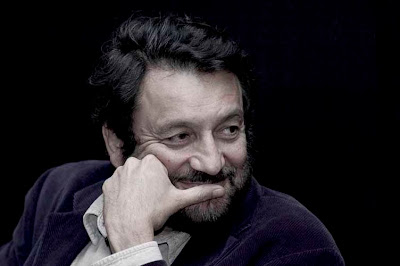
Shekhar Kapur, one of India's best known filmmakers worldwide, asked me to write something for his very popular blog and I most happily did. I am reproducing it here.
It got some very interesting comments as well from his readers.
Shekhar, thanks for having me on your blog.
Here goes:
"Quick! Help me! I have forgotten to write a letter!"
My wife, who generally does not think much of my slow moving brain until she needs its help, shook me this weekend as she broke a long silence as we watched the TV together."Huh?" I said."Do you write the date on the left or the right?" she said.
I took several seconds to soak in the deep meaning of what she had just said. I turned around slowly. There she was, cross-legged on the bed under the Rajasthani quilt, a pink letter pad on her knees and a pen in her hands.
I realised that this was some sort of an event which was in the works for half a day. When we had gone out in the evening to New Delhi's suburb of Noida, she had avoided walking into her favourite stores dragging behind her reluctant husband (as she is prone to), and instead looked for a stationery shop. Stationery? When was the last time we bought stationery or went into a stationery shop? We have so long ago catapulted from stationery to Blackberry. But she wanted to buy stationery. She said she wanted to write a letter. My wife is a television reporter and one of India's more prominent news anchors. She had received a handwritten letter of appreciation from an 80-year-old gentleman and she wanted to reply with a letter.
As she spent the next thirty minutes trying to write out her six lines, my mind leaped into a beautiful Bermuda Triangle of memory. When was it that I wrote my last handwritten letter? I rummaged through it – and found a lot of stuff in the letterbox of my past …

Ever since I was in school, letters were everything....
I wrote copious letters. I spent all my pocket money on letterpads. I wrote on papers torn from notebooks. I wrote on the page after the chemistry notes. I wrote in the fat diary with silly sayings that was delivered home on New Year's. Looking at a letter, I could tell the weight of a letter and the approximate value of stamps needed. I also received a lot of letters, mostly from literary magazine editors who rejected my poems, or my faraway girlfriend who my father disliked – or the young woman who my girlfriend didn't even know wanted to be my girlfriend.
If my father disliked the girlfriend, the postman disliked me – he had to come home in the rain and on hot afternoons to deliver my letters when no one else in the neighbourhood had been sent any by anyone in the world.
It was as if my day job began after I returned from school – it was to write letters.
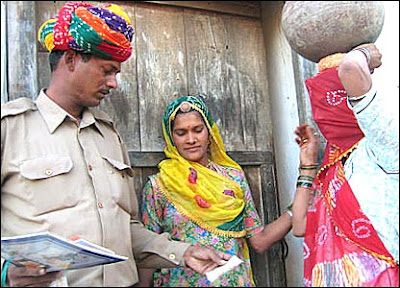
Letters were the soul of India. They were the soul of the small town that exists in each of us, the small town we carry as we make our journey through the mazes of the metropolis. The death of the everyday letter truly took away a huge chunk of the India I grew up in, its cultural anchor, its most eloquent storyteller."
You can read the rest of the piece here on Shekhar's blog.
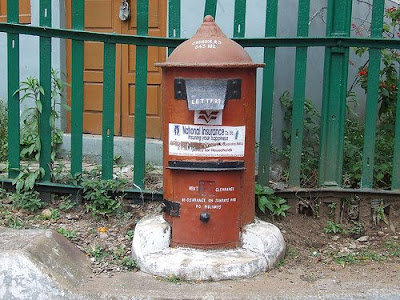
Photos courtsey: The Internet
Labels:
blackberry,
blog,
filmmakers,
letter writing,
shekhar kapur
Thursday, January 1, 2009
नए साल का गीत
इस गीत की कुछ पंक्तियाँ मैंने काफ़ी पहले लिखी थीं ... मुंबई के आतंकवादी हमले के बाद इसे पूरा किया. आपके साथ फिर से बाँट रहा हूँ. इसे एन डी टी वी पर संगीतबद्ध कर के दिखाया जा रहा है.
रेत में सर किए
यूँ ही बैठा रहा
सोचा मुश्किल मेरी
ऐसे टल जाएगी
और मेरी तरह
सब ही बैठे रहे
हाथ से अब ये दुनिया
निकल जाएगी
दिल से अब काम लो
दौड़ कर थाम लो
ज़िन्दगी जो बची है
फिसल जाएगी
थोडी सी धूप है
आसमानों में अब
आँखें खोलो नहीं तो
ये ढल जाएगी
आँखें मूंदें है ये
छू लो इसको ज़रा
नब्ज़ फिर ज़िन्दगी की
ये चल जाएगी
दिल से अब काम लो
दौड़ कर थाम लो
ज़िन्दगी जो बची है
फिसल जाएगी
रेत में सर किए
यूँ ही बैठा रहा
सोचा मुश्किल मेरी
ऐसे टल जाएगी
और मेरी तरह
सब ही बैठे रहे
हाथ से अब ये दुनिया
निकल जाएगी
कई साथियों के कंप्यूटर हिन्दी शब्दों को नहीं दिखाते हैं, इसलिए अगली पोस्ट में अंग्रेज़ी में भी शब्द लिख रहा हूँ.
चित्र साभार: राहुल पंडिता
Subscribe to:
Posts (Atom)
(All photos by the author, except when credit mentioned otherwise)
